|
Ebola outbreak:
No Sri Lankan infected by Ebola in West Africa - Ambassodor
Ratnapala
By Manjula Fernando
With the World Health Organisation (WHO) announcing the current Ebola
outbreak as an “International Public Health Emergency” on August 8, Sri
Lankan ambassador in Nigeria accredited to the West African countries
wrote to the foreign Ministry that none of the Sri Lankans had been
affected so far by the deadly virus.
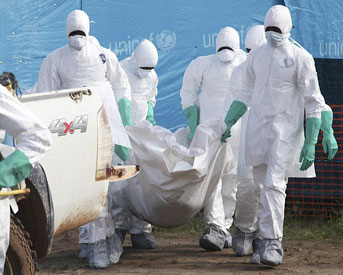 |
|
British doctors have been
warned to be vigilant to the signs of Ebola,after the disease
crossed international borders, reaching Nigeria's capitalof
Lagos. Pictured, Liberian health workers transport a woman who
infested by Ebola disease |
According to the Foreign Ministry there are about 1000 Sri Lankans in
Nigeria and most of them live and work in the city of Lagos, where eight
Nigerian cases have been reported and three deaths since July 20. But
none of the Sri Lankans so far have approached the Sri Lankan Mission
seeking assistance to return home.
The Ambassador said the outbreak has been confined to Lagos and there
was no immediate threat of the disease spreading to the capital Abuja
where the mission and the Sri Lankan staff is located.
“There are no reports of Sri Lankans in Nigeria, Sierra Leon, Guinea
or Liberia contracting the disease so far.”
Nigeria is one of the four countries to fall victim to the deadly
Ebola virus, after a Liberian-American national arrived in Lagos from
Liberia carrying the disease.
The outbreak was first reported in Guinea in March this year and so
far over 1280 laboratory confirmed cases have been reported in the West
African region with over 1069 of them already dead. The World Health
Organisation has termed the recent outbreak as the ‘worst’ in its 38
history.
The number of registered Sri Lankan employees in the affected West
African region are less than 150. They work in Sierra Leon, Senegal,
Ghana, Nigeria and Equatorial Guinea, the Foreign Employment Bureau
Deputy General Manager Mangala Randeniya said.
He said this number could differ drastically since some of the
workers travel from one African state to another without informing the
Bureau and there are workers who have left Sri Lanka without their
knowledge.
|
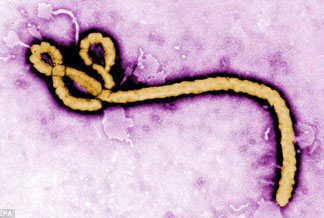 |
|
The virulent strain of the Ebola virus |
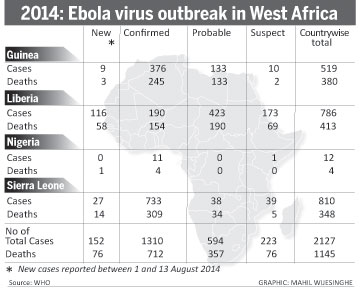 |
Speaking to Sunday Observer on Thursday The Deputy DG Randeniya said
the SLBFE will not be officially recalling the workers from the affected
region but if the relatives or the workers seek any assistance through
the Lankan mission in Nigeria to get back, they were prepared to assist
them.
He said there was a grave health risk in the countries the outbreak
has been reported and the workers should decide if they were ready to
take that risk and remain there or return to Sri Lanka.
“But if they are being held without their will by the employer, in
such a situation we will intervene and get them back to Sri Lanka,” he
said.
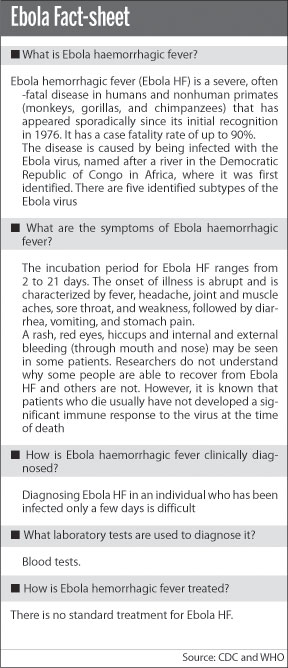 The SLBFE has notified local job agents to cease sending workers to
West Africa until the Ebola outbreak is controlled. The families have
been cautioned to ask their relatives to come back if they are in high
risk areas for their own safety. The SLBFE has notified local job agents to cease sending workers to
West Africa until the Ebola outbreak is controlled. The families have
been cautioned to ask their relatives to come back if they are in high
risk areas for their own safety.
Meanwhile, the Sri Lankan health authorities have tightened
surveillance at its international airports and sea ports to detect
anyone coming in with a high temperature and Ebola symptoms – Fever,
Nausea, Headache, Tiredness (early stage), vomiting, diarrhoea, coughing
and bleeding (late stage).
According to the Center for Disease Control and Prevention in
Atlanta, US the first detection of the Ebola virus was made in 1976 in
Zaire now known as the Democratic Republic of Congo (DRC). During this
first outbreak 318 reported cases of humans affected by the virus was
identified.
In the same year 284 cases of victims were found in South Sudan. The
rate of fatalities in DRC was 88% while in South Sudan 53 % of the
disease stricken had died.
After 1976 and 1979 another outbreak was reported after fifteen years
in 1994 in Gabon where 31 out of 52 died in a mild outbreak.
There was a bigger outbreak again the DRC in 1995 with 315 getting
Ebola and 250 out of them dying due to complications linked to the
disease. In 1996, a small outbreak was reported in Gabon and another
serious outbreak was reported in 2000-2001 in Uganda with 425 reported
cases and over half of them dying. After 2000 and 2007 where less than
two hundred cases were reported, the worst outbreak in the history of
Ebola came in March this year and it has been fast spreading with a
chilling death rate.
Commmunication, an issue in West Africa
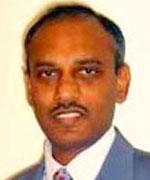 |
|
Ambassador in Nigeria
A.L.Ratnapala |
Sri Lankan Ambassador in Nigeria A.L.Ratnapala in a telephone
interview with the Sunday Observer on Friday said no one has expressed
the desire so far to come back to Sri Lanka due to this epidemic.
He confirmed that there were about 800-1000 Sri Lankans living in
Nigeria at present but in the rest of the West Africa, he had no exact
figure as to how many Sri Lankans were living in those countries.
“In those countries it is difficult to communicate. There are no
telephones, even though there are embassies they don't respond to
telephone calls.
There are no regular working hours. I checked with missions based in
Abuja, and have learnt that there is no indication or minimum chance for
Sri Lankans to be in worst affected areas of Sierra Leon, Guinea or
Liberia.
Q: If someone needs assistance to come back to Sri Lanka, do
you have any mechanism in place to assist them?
A: We have communicated to Sri Lankans in Nigeria about the
precautions that needs to be taken to prevent a possible contraction.
Since the international flights are still operating there is no need for
our assistance at this stage for them to get back.
All of the Lankans on working permits there, are working for
multinational companies, like Banks, etc.. They have the financial
stability to look after the workers if a situation for an emergency
evacuation or something similar arises. Nigeria is not like in the
middle east where you find stranded Sri Lankans who need help to come
home.
There are no such workers in this region, those who are staying
behind are doing so with their own will. They are being sheltered and
cared for by the employers. There is no immediate need to intervene.
There are two categories of Sri Lankans in Nigeria, those who are
living as paid workers, the second category are the dependents of Sri
Lankans who came to work in Nigeria about 30 – 40 years ago. Many Sri
Lankan engineers and teachers came to work in Nigeria some three to four
decades ago, most of them have returned now but the dependents still
live on. They are almost Nigerian but they carry Sri Lankan passports.
Our estimates say there are about 100 people who belong to this
category.
Q: If someone contracts the virus and wants to return home,
what would be your reaction?
A: My advice is to keep that person in Nigeria or in some
other country and give the required medical treatment. Sending him back
to Sri Lanka where there is a risk of its spreading within the country,
is not desirable unless his family insists in doing so.
We must encourage him to get to hospital and be exposed to treatment.
Q: How is the staff coping with the unnerving reports of
deadly Ebola fast spreading in the region with WHO announcing as many as
56 deaths within two days from August 10 to 11?
A: In the mission we have just four Sri Lankan staffers
including myself. This epidemic is in Lagos located some 400-500 kms
off. The mission is in Abuja and there have not been any reported cases
in Abuja up to now.
We have informed the Lankans as to how the virus is contracted and
how to keep themselves safe. We have not asked them to leave, as of now
it remains their decision to do that. And most of the people have no
desire to return. It has not reached to that level. The Nigerian
government has taken precautions. Only the primary contacts have been
affected so far. The first person who carried the virus from Liberia has
been in contact with about 70 people. He had collapsed at the
International Airport in Lagos and he was taken to hospital from there.
Those primary contacts are now under close observation. Already about
three of them have died of Ebola. (Local news sources reported ten
confirmed cases and four deaths in Nigeria by Friday evening.)If there
are secondary contacts then we can say the disease is spreading and we
may need to revise our advice to Lankan workers. |

